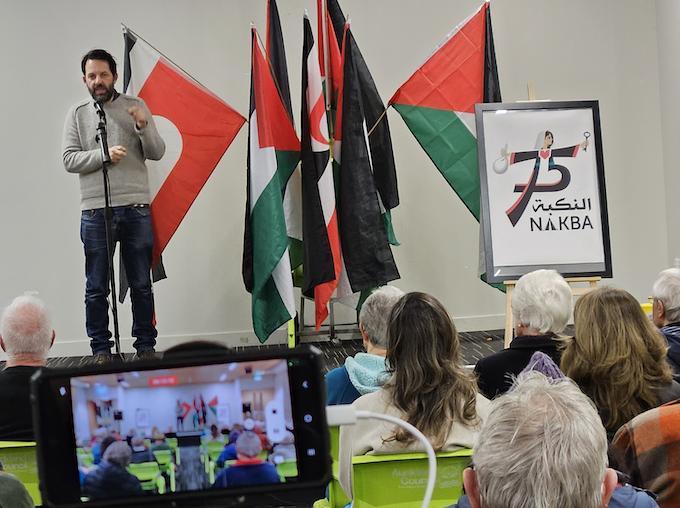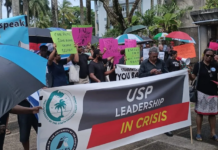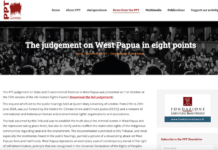
Journalist and critic of Israeli apartheid Antony Loewenstein wrapped up his New Zealand tour with another damning address in Auckland last night but was optimistic about a swing in global grassroots sentiment with a stronger understanding of the plight of the repressed 5 million Palestinians. In this article for Middle East Eye, he says that for more than a half century the occupation of the West Bank and Gaza has given the Israeli state invaluable military experience in “controlling” a population.
By Antony Loewenstein
The Israeli defence industry inspires nations across the globe, many of which view themselves as under threat from external enemies.
The Taiwanese foreign minister, Joseph Wu, recently told the Israeli newspaper Haaretz that: “Every aspect of the Israeli fighting capability is amazing to the Taiwanese people and the Taiwanese government.”
Wu explained that he appreciated how Israel protected its own country because, “basically, we [Taiwan] have barely started. The fighting experiences of Israel are something we’re not quite sure about ourselves. We haven’t had any war in the last four or five decades, but Israel has that kind of experience”.
- READ MORE: Antony Loewenstein: Palestine a testing ground for war tech
- Middle East Eye
- Antony Loewenstein’s website
Wu also expressed interest in Israeli weapons, suggesting his country had considered their usefulness in any potential war with China.
“Israel has the Iron Dome,” he said, referring to Israel’s defence system against short-range missiles. “We should look at some of the technology that has been used by the Israelis in its defence. I’m not sure whether we can copy it, but I think we can look at it and learn from it.”
It isn’t just Taiwan imagining itself as akin to Israel. Ukrainian President Volodymyr Zelensky said in April 2022 that his vision for his nation was to mimic “the Jewish state“.
Two months after Russia’s illegal invasion of its territory, Zelensky, who is a long-time supporter of Israel, argued that “our people will be our great army. We cannot talk about ‘Switzerland of the future’ — probably, our state will be able to be like this a long time after. But we will definitely become a ‘big Israel’ with its own face.”
Zelensky went on to explain that what he meant was the need in the future to have “representatives of the armed forces or the national guard in all institutions, supermarkets, cinemas; there will be people with weapons.”

The Palestine laboratory
This admiration for Israel is both unsurprising and disturbing. The praise for Israel almost always completely ignores its occupation of Palestinian territory — one of the longest in modern times — and the ways in which this colonial project is implemented.
When Taiwan, Ukraine or any other country looks to Israel for innovation, it’s a highly selective gaze which completely disappears the more than five million Palestinians under Israeli military occupation in the West Bank, East Jerusalem and Gaza.

The appeal of the Palestine laboratory is endless. I’ve spent the last years researching this concept and its execution in Palestine and across the globe.
My new book, The Palestine Laboratory: How Israel Exports the Technology of Occupation Around the World, uncovers how Israel has used the occupied Palestinians as the ultimate guineapigs when developing tools of repression, from drones to spyware and facial recognition to biometric data, while maintaining an “enemy” population, the Palestinians, under control for more than half a century.
Israel has sold defence equipment to at least 130 countries and is now the 10th biggest arms exporter in the world. The US is still the dominant player in this space, accounting for 40 percent of the global weapons industry.
Washington used its failed wars in Iraq and Afghanistan as a testing ground for new weapons. During the current Russian invasion of Ukraine, the war has been a vital “beta test” for new weapons and sophisticated forms of surveillance and killing.
But Israel has a ready-made population of occupied Palestinians over which it has complete control. For more than five decades, Israeli intelligence authorities have built an NSA-level system of surveillance across the entire occupied Palestinian territories.
Nowhere is completely immune from listening, watching or following.
In the last decade, the most infamous example of Israeli repression tech is Pegasus, the phone hacking tool developed by the company NSO Group. Used and abused by dozens of nations around the world, Mexico is its most prolific adherent.
I spoke to dissidents, lawyers and human rights activists in Togo, Mexico, India and beyond whose lives were upended by this invasive, mostly silent tool.
Israeli state and spyware
However, missing from so much of the western media coverage, including outrage against NSO Group and its founders who were Israeli army veterans, is acknowledgement of the close ties between the firm and the Israeli state.
NSO is a private corporation in name only and is in fact an arm of Israel’s diplomacy, used by Prime Minister Benjamin Netanyahu and the Mossad to attract new friends in the international arena. Despite being blacklisted by the Biden administration in November 2021, the company still hopes to continue trading.

My research, along with that of other reporters, has shown a clear connection between the sale of Israeli cyberweapons and Israel’s attempts to neuter any potential backlash to its illegal occupation.
From Rwanda to Saudi Arabia and the United Arab Emirates to India, Israeli spyware and surveillance tech are used by countless democracies and dictatorships alike.
Beyond Pegasus, many other similar tools have been deployed by newer and lesser-known Israeli companies, though they’re just as destructive. The problem isn’t just Pegasus — it could close down tomorrow and the privacy-busting technology would transfer to any number of competitors — but the unquenchable desire by governments, police forces and intelligence services for the relatively inexpensive Israeli tech that powers it.
India is even looking for alternatives to NSO Group with a less controversial history.
The Palestine laboratory is so successful because nobody wants to seriously regulate the fruits of its labours.
Ideological alignment
The extent of Israeli collusion with 20th and 21st century repression is overwhelming.
Perhaps the most revealing was the deep relationship between apartheid South Africa and Israel. It wasn’t just about arms trading, but an ideological alignment between two states that truly believed that they were fighting for their very existence.
In 1976, Israeli Prime Minister Yitzhak Rabin invited South African Prime Minister John Vorster, a Nazi sympathiser during the Second World War, to visit Israel. His tour included a stop at Yad Vashem, the country’s Holocaust memorial in Jerusalem.

When Vorster arrived in Israel, he was feted by Rabin at a state dinner. Rabin toasted “the ideals shared by Israel and South Africa: the hopes for justice and peaceful coexistence”. Both nations faced “foreign-inspired instability and recklessness”.
Israel and South Africa viewed themselves as under attack by foreign bodies committed to their destruction. A short time after Vorster’s visit, the South African government yearbook explained that both states were facing the same issue: “Israel and South Africa have one thing above all else in common: they are both situated in a predominantly hostile world inhabited by dark peoples.”
A love of ethnonationalism still fuels Israel today, along with a desire to export it. Some arms deals with nations, such as Bangladesh or the Philippines, are purely on military grounds and to make money.
Israel places barely any restrictions on what it sells, which pleases leaders who don’t want meddling in their actions. Pro-Israel lobbyists are increasingly working for repressive states, such as Bangladesh, to promote their supposed usefulness to the West.
Israel and the global far right
But Israel’s affinity with Hungary, India and the global far right, a group that traditionally hates Jews, speaks volumes about the inspirational nature of the modern Israeli state. As Haaretz journalist Noa Landau recently wrote, while explaining why Netanyahu’s government defended the latest arguably antisemitic comments by Elon Musk about George Soros:

“The government’s mobilisation in the service of stoking antisemitism is not surprising. It is the fruit of a long and consistent process in which the Netanyahu government has been growing closer to extreme right-wing elements around the world, at the expense of Jewish communities it purports to represent.”
It’s worth pausing for a moment to reflect on this undeniable reality. Israel, which claims to represent global Jewry, is encouraging an alignment between itself and a hyper-nationalist, bigoted and racist populism, regardless of the long-term consequences for the safety and security of Jews around the world.
Israel has thrived as an ethnonationalist state for so long because the vast bulk of the world grants it impunity. European nations have been key supporters of Israel, willing to overlook its occupation and abuse of Palestinians.
According to newly declassified documents from the files of Israel’s Ministry of Foreign Affairs, between 1967 and 1990 it’s clear that West Germany was becoming more critical of Israel’s settlement project in Palestine, but the main concern was protecting its own financial interests in the region if a regional war broke out.
In a document written on 16 February 1975 to the deputy director of Israel’s Ministry of Foreign Affairs for Western Europe, Nissim Yaish, before Israel’s Foreign Minister Yigal Allon’s visit to West Germany, Yaish explained the thinking in his country’s diplomatic bureaucracy:
“There is unanimity that this time such a war will have a far-reaching impact on all its affairs internally and externally and that it could wreak a Holocaust on the German economy. Based on this attitude, West Germany is interested in rapid progress toward a [peace] agreement.”
Western silence
But there has rarely been any serious interest in pursuing peace, or holding Israel to account for its blatantly illegal actions, because the economic imperative is too strong. Even today, when another Nakba against Palestinians is becoming more possible to imagine, there’s largely silence from Western elites.
Germany has banned public recognition of the 1948 Nakba and criminalised any solidarity with the Palestinian people. Germany is also keen to buy an Israeli missile defence system, confirming its priorities.
This is why Israeli apartheid and the Palestine laboratory are so hard to stop; countless nations want a piece of Israeli repression tech to surveil their own unwanted populations or election meddling support in Latin America or Africa.
Without a push for accountability, economic boycotts and regulation or banning Israeli spyware — the EU is flirting with the idea — Israel can feel comfortable that its position as a global leader in offensive weapons is secure.
This article was first published in the Middle East Eye.

















































